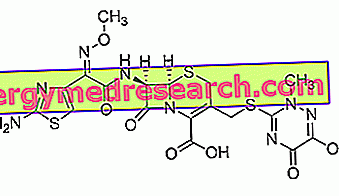Generality
To dissolve the phlegm it is necessary to use products that are able to fluidify this viscous secretion.

Typical of colds and certain diseases that involve the respiratory tract and ear (catarrhal otitis), catarrh - also known as sputum - represents a pathological secretion that manifests itself in the presence of inflammatory processes.
To dissolve the phlegm it is possible to use both specific drugs and some natural remedies. However, since the presence of this viscous secretion in large quantities can be an indication of serious pathologies, it is always a good idea to request medical assistance and avoid undertaking any kind of do-it-yourself treatment without first consulting it.
drugs
Drugs to Dissolve Catarrh
To dissolve the phlegm, the drugs mainly used are the so-called mucolytics and mucoregulators.
The mucolytic drugs act directly on the mucus (phlegm) already formed, physically breaking the chemical bonds of the molecules that constitute it. In other words, the mucolytics are able to dissolve the phlegm through the degradation of the mucoproteins that compose it. Thanks to this particular mechanism of action, catarrhal secretions will be less viscous and more easily eliminated by the body. An example of an active ingredient from the mucolytic activity is represented by N-acetylcysteine (Fluimucil Mucolitico®).
Mucoregulatory drugs, on the other hand, exert what is referred to as an indirect action on phlegm. These drugs, in fact, do not degrade the sputum already formed like the mucolytics, but act on the muciparous cells altering the secretion and the characteristics of the phlegm produced by them (for example, they can increase the aqueous component, thus reducing the viscosity), or they can act by altering their adhesiveness.
Examples of active ingredients belonging to this group of drugs are carbocysteine (Fluifort®), bromexina (Bisolvon Linctus®), sobrerol (Sobrepin®) and ambroxol (Fluibron®).
Did you know that ...
Some active ingredients with a mucolytic and mucoregulatory action are also able to act on the ciliated epithelium of the respiratory tract, increasing the mucociliary clearence and further favoring the expulsion of the phlegm.
Method of Employment
The drugs used to dissolve the phlegm can be taken substantially by inhalation through aerosol therapy, or by mouth in the form of syrups, effervescent tablets, granules for solutions or oral suspensions, etc.
As regards the dosage, on the other hand, it is necessary to follow the indications provided by the doctor or, possibly, the indications on the illustrative leaflet of the medicinal product to be used.
Side effects
The side effects induced by the intake of mucolytic and mucoregulatory drugs may vary not only from patient to patient but also depending on the active ingredient used.
However, examples of side effects common to all the aforementioned drugs are those that can occur in the digestive system, such as nausea, vomiting, diarrhea, dyspepsia and abdominal pain. Furthermore, all mucolytic and mucoregulatory drugs can trigger allergic reactions in sensitive and predisposed individuals.
Pregnancy and breastfeeding
In general, as a precaution, the use of drugs to dissolve phlegm by pregnant women and breastfeeding mothers is contraindicated.
However, this category of patients must seek the advice of their doctor before taking any type of medicine.
Contraindications
Without a doubt, all the medicines used to dissolve the phlegm are contraindicated in the presence of a known allergy to the active ingredients and / or excipients they contain.
As for any other contraindications, instead, it is necessary to consult the illustrative leaflet of the drug that must be taken.
Please note
Even if some of the aforementioned mucolytic and mucoregulatory drugs can be purchased without a prescription, before taking any medicine to dissolve the phlegm, it is essential to consult your doctor, in order to rule out any contraindications.
Furthermore - in order to undertake the right treatment to dissolve the phlegm - it is very important to identify the exact cause that caused its formation. This diagnosis operation, of course, is solely for the doctor.
Natural remedies
Natural Remedies for Dissolving Catarrh
To dissolve the phlegm it is also possible to use different natural remedies. Therefore, some of the natural products most used in this area will be briefly described below.

Essential Eucalyptus Oil
A typical example of a natural remedy capable of dissolving the phlegm is represented by the eucalyptus, whose essential oil has balsamic, expectorant and secretolytic (or mucoregulating ) activities. Not surprisingly, the German Commission has approved the use of this plant for the treatment of cough, bronchitis and catarrhal diseases of the respiratory tract.
To dissolve the phlegm, the essential oil of eucalyptus can be taken orally, although its use in fumigations is more common. In the latter case, it is generally advisable to dilute 3-6 drops of product in a bowl of boiling water and to inhale the hot vapors that are released.
Other Essential Oils
To dissolve the phlegm, it is also possible to use other essential oils with balsamic and secretolytic properties with which fumigations can be performed. Among these, we recall the essential oil of mint and the essential oil of thyme .
Please note
Essential oils can trigger allergies in sensitive individuals. Furthermore, their use is generally contraindicated during pregnancy, lactation and in children.
In particular, fumigations with essential oils are always contraindicated in pediatric age, since in this category of patients there is an increased risk of undesirable effects such as allergic reactions, bronchospasm and asthma attacks.
Snail Extracts
Among the natural remedies used to dissolve the phlegm there are also snail extracts, included in the composition of syrups to be administered in the presence of fat cough. In fact, the snail's syrup is attributed with fluidifying properties of the bronchial mucus and expectorants .
However, the use of this syrup is contraindicated in patients with asthma or with a known product allergy. However, for more information on this, please refer to the article on this site.
Fennel
Another natural remedy used to dissolve the phlegm is fennel. To tell the truth, this plant is not able to dissolve the phlegm in the true sense of the word, but the trans-anethole and fencone contained in its essential oil have shown to be able to inhibit the action of the muciparous glands of the respiratory system, thus hindering the production of phlegm.
In this context, fennel can be used internally by directly taking the essential oil by mouth, or it can be taken as an infusion obtained from fresh seeds. In any case, for more detailed information on the use of fennel to dissolve the phlegm, see the article on "Treating yourself with Fennel".
The use of essential fennel oil by mouth is contraindicated in case of allergy to the plant and in the presence of inflammation of the gastrointestinal tract. Furthermore, the use of fennel for therapeutic purposes is generally contraindicated even in pregnancy, during lactation and in children.
Please note
Before taking the remedies described above to dissolve the phlegm, it is always good to ask the advice of your doctor. In fact, although these are substances of natural origin, it does not mean that they are free of side effects or contraindications.
Furthermore, it is reiterated the importance of contacting a doctor to identify the cause of sputum formation, in order to determine which treatment is best suited to dissolve the phlegm formed in each patient.



